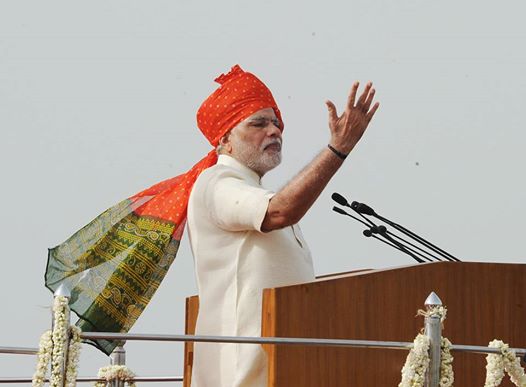MODI HITS THE RIGHT SPOTS
Narendra Modi

NEW DELHI: The expansive orator of the Lok Sabha campaign trailer, the magician weaving dreams was back after almost three months, this time as the Prime Minister of India on the ramparts of the Red Fort on Independence Day. PM Narendra Modi was at his oratory best promising everything from toilets to satellites, from agriculture to high speed manufacturing, from a gender just to a communal and caste violent free India in a mesmerising flow of words.
The promise of making India every citizen’s dream come true during the election campaign--development, employment, falling prices---were added to in large measure. ‘Make in India’ for manufacturing; “Digital India’ for technology; Clean India to be dedicated to Gandhi by the nation for his 150th birth anniversary were just some of the big promises articulated by the Prime Minister. He brought in the ordinary citizen to mesh with the government in a seductive vision of India, a virtual utopia for all, even as he urged parents to keep a check on their sons to ensure they did not commit violence against women.
After a long time the grounds at the Red Fort were packed with an attentive and responsive audience. Modi spoke extempore for about an hour without once referring to notes. He spoke in Hindi and spoke for ‘inclusion’. He urged the people for a ten year moratorium of communal and caste violence, saying that this divisiveness set back the development of India. The nation heard PM Modi saying, “sadly we saw instances of communal violence for long. How long will this go on? No one has gained anything from this.”
He did not speak against Pakistan ---unlike Prime Minister Manmohan Singh at the same spot last year---but instead focused on Saarc nations and their joint fight against poverty. A senior diplomat from a member nation nodded his head in approval, saying that the Prime Minister had not said a word that could be questioned.
As always he spoke about himself, referring to the Constitution of India that the RSS has never really accepted, as having given the opportunity to a child from a poor family to become the Prime Minister of India. He spoke of himself as an ‘outsider’ who had been shunned by the elite of Delhi, but now had an ‘insiders’ vision of governance. He said what he had observed shocked him, as there was a factional war going on inside the government, with departments having their own fiefdoms, pitted against each other and going to the courts to resolve their differences; and said he was determined to break down these walls, and take the country forward as an organic, united entity.
PM Modi chose to speak about domestic issues---about the safety the girl child, about the lopsided sex ration, about communal harmony, about economic development focusing on manufacturing, on toilets and cleanliness---and not bother himself in his first address to the nation about international issues that have not been his strong point. The violence in the world was thus eclipsed by domestic issues, and here too it was not terrorism, or security that was emphasised but very interestingly inclusiveness and development starting from issues such as toilets for all to a just society.
It was an interesting address, different from the usual platitudes of the past, not soul stirring but a practical potpourri of what he would like to do and what he plans to do. At the end of the day a tall order for himself, even though he declared to applause that he would move the country forward on the suggested lines.



